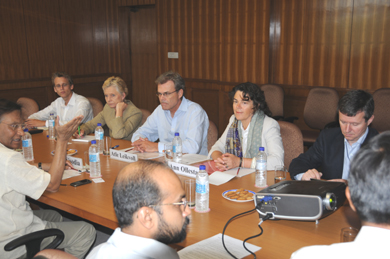You are here
Interaction with the Delegation from the Ministry of Foreign Affairs, Norway
 A delegation from the Ministry of Foreign Affairs, Norway, visited IDSA on June 17, 2009. Mr. Atle Leikvoll, Deputy Secretary General, Norwegian Ministry of Foreign Affairs led the delegation from Oslo. The delegation was accompanied by the Norwegian Ambassador to India, Her Excellency Ann Ollestad. The topic of the interactive session was regional security in South Asia with particular focus on Afghanistan, Pakistan, Sri Lanka and Myanmar.
A delegation from the Ministry of Foreign Affairs, Norway, visited IDSA on June 17, 2009. Mr. Atle Leikvoll, Deputy Secretary General, Norwegian Ministry of Foreign Affairs led the delegation from Oslo. The delegation was accompanied by the Norwegian Ambassador to India, Her Excellency Ann Ollestad. The topic of the interactive session was regional security in South Asia with particular focus on Afghanistan, Pakistan, Sri Lanka and Myanmar.
In his introductory remarks, the Director General of IDSA welcomed the delegation and elaborated upon the overall security situation in South Asia. Ambassador Leikvoll at the outset described that Indo-Norwegian relationship is based on competence and knowledge. Commenting upon the institutional level tie-up with the IDSA and Norwegian research institutions, he was hopeful for an excellent common future. On regional security he commented that India is situated in a very complex region.
Captain Alok Bansal (Member, Indian Navy at IDSA) made a presentation on the on-going military operations in the Swat Valley, sectarian cleavages in Pakistan, the challenge of growing Talibanisation, Pakistan’s poor economic indicators and finally the problem of Internally Displaced Persons (IDPs) as a result of excessive use of force by Pakistani security forces. He noted that earlier there had been no serious attempt by the Pakistani army to combat the Taliban, but at present the Pakistani security forces have been using conventional forces and arms against its own population. On Afghanistan, he emphasised that it was a mistake to differentiate between ‘good’ and ‘bad’ Taliban, and in a tribal society like Afghanistan inviting any Taliban leader for a dialogue would enhance his legitimacy in the eyes of his own clan. Similarly he opined that any discussion of an exit strategy for Afghanistan would strengthen the Taliban. On Sri Lanka, Captain Bansal briefed the Norwegian delegation about the security situation after the LTTE has been militarily decimated but cautioned about the activities of the networked Tamil diaspora throughout the world.
Dr. Arvind Gupta, Lal Bahadur Shastri Chair at IDSA, highlighted India’s perceptions and views of its immediate security environment. Depicting Pakistan’s security situation as a prolonged chaos, he stated that the situation in Pakistan has not only been a threat for India’s internal security but for international security as well. On Afghanistan, he opined that historically Afghanistan had always been a buffer state, therefore the neutrality of Afghanistan should be re-established and the international community should underwrite Afghanistan’s security. Depicting India’s role in Afghanistan as quiet and positive so far, he proposed that India must initiate dialogue with concerned countries on Afghanistan. Dr. Gupta highlighted that the US would have to prioritise between Iran’s nuclear programme and seeking Iran’s cooperation to stabilise Afghanistan.
Mr Leikvoll described the security condition in Afghanistan as a stalemate and Army operations in Pakistan as weak. He also stressed on a broader regional approach including Iran vis-à-vis Afghanistan. He underscored that India’s role in Afghanistan has so far been appreciated but India must increase its influence in Afghanistan. Regarding Sri Lanka, he recounted the recent demonstrations staged by Tamil expatriate organisations against the Norwegian establishment and the Sri Lankan embassy in Oslo.
Dr. Udai Bhanu Singh made a presentation on Myanmar, highlighting the internal challenges within and the strategic necessity for India to engage the ruling military junta. He explained the enormous strategic importance of Myanmar, given its location at the tri-junction of East, South and South East Asia. Dr. Singh noted the substantial strategic and economic investments by China in Myanmar in recent years, which have been a concern for India. Nevertheless he noted that the Myanmarese junta is fairly independent in its pursuit of foreign policy interests. He made the observation that the neighbouring states of Myanmar have a greater stake in the stability of the state and are unlikely to impose sanctions. However, the West especially the US and the EU, have been vociferously critical about the human rights situation in Myanmar but the sanctions against Myanmar have been unsuccessful. The Norwegian delegation also admitted that sanctions against Myanmar have not worked and a more nuanced policy has to be formulated.
Prepared by Kartik Bommakanti and Alok Rashmi Mukhopadhyay
